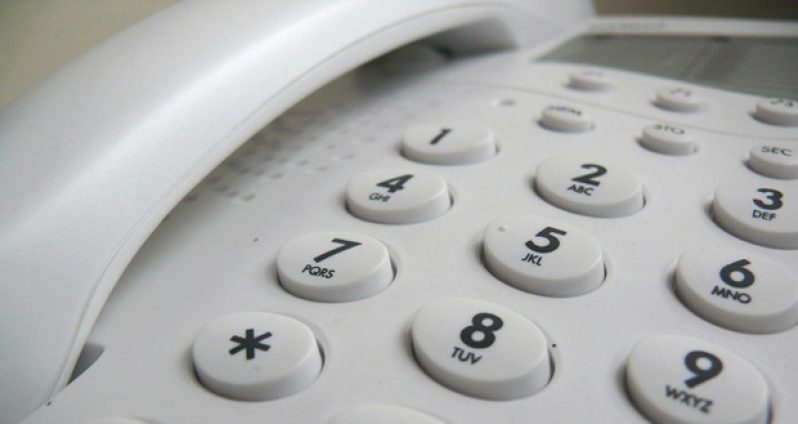–says GT&T failed to add US$90M to landline earnings
THE Guyana Consumers Association (GCA) has submitted additional arguments to the Public Utilities Commission (PUC) to show that the Guyana Telephone and Telegraph Company (GT&T)company is earning much more on its landline services than it is stating and therefore its requests for rate increases are totally unjustifiable.
According to GT&T’s application made earlier this year, the US-owned company wants increases in charges for applications, installations, transfers, additional jacks, wake-up calls, 3-way calls , voicemails, call forwarding, reconnection fees, and for peak and non-peak calls.
The rate increases requested range from between 20-60 percent on the current charges.
In a supplement to an earlier memorandum detailing its objections to rate increases by the GT&T, the GCA argued that if all the landline earnings are added to the earnings stated by the GT&T, then the present charges and rates should be drastically reduced rather than increased.
The GCA argued that GT&T had failed to add some US$ 90M to its landline earnings ; this money being the interest obtained from the landline revenue used to finance its cellular services .
At least US $1.5 million per annum as rental from the Internet for the use of the landline fibre-optic and copper wires ; at least G$828 million per annum earned by the landline fibre-optic and copper lines to transmit mobile traffic, plus billions of dollars from the sale of the undersea cable were other income which GT&T should have added to its stated landline earnings.
The huge depreciation gains from the landline assets which have a book value of nil had also been omitted in the computation of the landline revenues which GT&T used to justify its request for a rate increase in its services.
The GCA asserted that these and other earnings by the GT&T must be attached to the present rates to arrive at a true picture as to the full earnings of the landline services.
The GCA added: “Throughout the filing of its application for a rate increase, the GT&T has been saying that the costs of the landline services exceed the revenues earned. But the joker in the pack (of cards) is simply that the other landline earnings have not been added to the landline rates given.
“If the full earnings of the landline services are taken into account, then the GT&T would have been compensated many times more than the increased rates for which they are asking. If the PUC takes the full income of the landline into account then GT&T’s request would have been more than met and there would no reason or cause to increase the present landline charges and rates,” the GCA stated.
In this regard, the GCA also called on the PUC to ensure that the GT&T institutes a system of segment accounting and disaggregation – a much more transparent system of accounting, it said.
The GCA said that by not having a system of segment accounting and disaggregation of accounts, many areas of GT&T’s financial activities remain unseen , unknown, generally opaque and open to question.
“By insisting on such accounting,” the GCA stated, the truth of their income and expenditure will be easily and clearly seen.”
Advancing other reasons for rejecting the application, the GCA warned that any increases at this time could disturb or distort the market as the telecommunication industry is about to be liberalised, allowing new players to enter.
“Any increases granted would introduce monopoly rates into the new liberalised structure and would immediately distort it before it has a chance to function.”
The GCA stressed: “With liberalisation, the market shapes rates; rates are not shaped before so as to pre-empt the market forces.”
The market forces, the GCA said will accomplish price or rate equilibrium and all parties will gain from this once they allow the free market to function unimpeded.
“This is the major object of liberalisation, and there is massive literature supporting this position.”
Additionally, the GCA warned that giving GT&T a splurge of Guyana dollars by the steep landline rate increases would lead to immediate conversion to US dollars and the weakening of the Guyana dollar.
It noted that this phenomenon had occurred before when Atlantic Telecommunications Network (ATN/GT&T came into Guyana when one of the first things they did was to convert the hundreds of millions of Guyana dollars into US dollars thereby depreciating the Guyana dollar by 10%.
The GCA also noted that GT&T’s application for the rate increases was based on the fear that a new telecommunication law was likely to be approved by Parliament by August 2014.
“In these circumstances, GT&T had said it considered the rate increases filing critical to its financial viability going forward and essential to rational introduction of competition.”
Today the GCA noted, the parliamentary majority has declared that their priority is a No Confidence motion and general elections thereafter and therefore there is no urgency for passing of any telecommunication law by Parliament.
The GCA said that from all indications, it will take a year or probably longer before the telecommunication law will be considered by parliament.
“It would be apposite for GT&T to withdraw their application until Parliament is ready to pass the Telecommunications Act; and the PUC should require the company to do so,”the GCA supplementary to its memorandum to the PUC said.
The hearings by the PUC on the GT&T application for increased landline rates continue today at Duke’s Lodge in Kingston.
(By Clifford Stanley)





.jpg)








